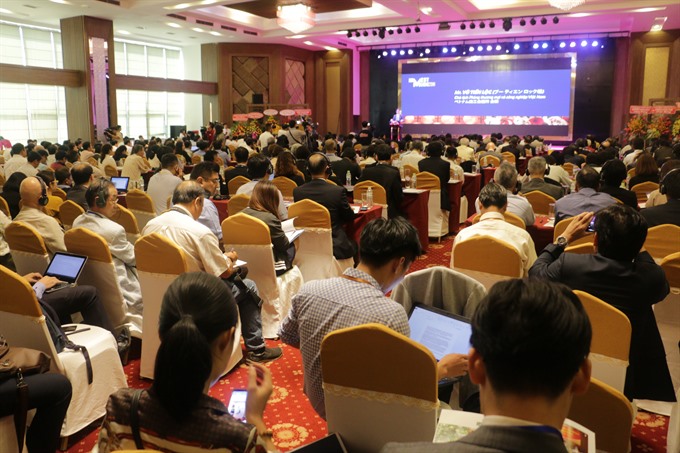Localities in the Mekong Delta region have called for investment in 63 projects related to industry, tourism, agriculture and logistics infrastructure.

Localities in the Mekong Delta region have called for investment in 63 projects related to industry, tourism, agriculture and logistics infrastructure, with total capital of VND250 trillion (US$10.71 billion).
The projects were announced at the 6th Annual Mekong Delta Investment Forum (MekongInvest) 2018 in Can Tho City, hosted by the Viet Nam Chamber of Commerce and Industry (VCCI) – Can Tho branch on November 3.
The forum, which connected Japanese investors with the 13 provinces of the Mekong Delta, drew more than 150 Japanese enterprises as well as local trade promotion agencies and businesses.
Cooperation potential in tourism and agriculture were the main topics discussed by participants.
Vu Tien Loc, VCCI’s chairman, said the region aimed to have 52 million visitors with total revenue of VND111 trillion, under the tourism development plan for the Mekong Delta approved in 2016 by the Prime Minister.
However, although the number of foreign tourists to Viet Nam has grown strongly over the last 10 years, arrivals in the Mekong Delta remain modest, with only 1/20 of total arrivals per year being foreign tourists.
Accommodations are also seriously lacking, as the entire region has only 60 3- to 5-star hotels, mainly on Phu Quoc Island and in Can Tho, and two major entertainment areas, Vinpearl Phu Quoc and Bac Lieu’s Nha Mat Resort. This has resulted in hotel occupancy of about 4 per cent, lower than in other areas of the country.
“This shows that the Mekong Delta tourism development has not been on par with its potential,” Loc said.
At the forum, localities in the Delta called for investment in major tourism projects in various provinces, including the U Minh Thuong Eco-tourism Area (Kien Giang), HAPPYLAND Commune Tourism Service Complex (Long An), Con Giong Resort and Tourist Area (Vinh Long), and Bung Binh Thien Ecological Tourism Area (An Giang), with total investment capital of VND15 trillion.
Takahashi Ayumi, chief representative of the Japan Tourism Promotion Agency in Viet Nam (JNTO), said that enterprises in the sector should improve linkages to avoid duplicative tourism products.
Attention should also be paid to improving the quality of human resources in the tourism sector, focusing on customer communications and foreign language skills.
Ayumi noted that tourism promotion activities in the region had not attracted many foreign tourists. Most tourists are not familiar with the region and would rather visit big cities like Ha Noi, HCM City and Da Nang.
He said the JNTO would work with local administrators to introduce Japanese culture through cultural exchanges with arts programmes and exhibitions of traditional Mekong Delta products.
The JNTO would also connect the local tourism sector with the Japan Association of Travel Agents to share information about foreign tourists’tastes.
Ayumi said that it was crucial that local provinces and cities step up their call for investment in expanding airports, improving power systems, and upgrading infrastructure to meet the demand of visitors.
As for agriculture, the Mekong Delta has great demand for advanced technologies to improve its farm production and seafood processing for exports, according to Nguyen Phuong Lam, deputy director of VCCI Can Tho.
With favourable conditions for agriculture, the Delta plays a very important role in the country’s economy. It contributes over 50 percent of food output, nearly 70 percent of seafood exports, 90 percent of rice exports, and 20 percent of the nation’s GDP.
However, "the per capita local income has not matched their contributions because most farmers still use traditional cultivation methods and depend on weather conditions," Lam said, noting that the rate of mechanisation in rice harvesting was only 65 percent and that breeding techniques remained poor.
Each year, rice growers suffer from post-harvest losses of VND3.2-3.6 trillion ($143 million – 161 million), or 12 per cent of total output, equivalent to 2.16 million tonnes of rice.
The limited application of advanced equipment in the processing stage has also made it difficult for locally made products to make inroads into choosy markets.
The region hopes to collaborate with foreign agri-tech companies to improve its competitiveness.
According to Takimoto Koji, chief representative of the Japan External Trade Organisation in Viet Nam (JETRO), the Vietnam Agricultural Information Centre Company in Japan (VAIO) is launching a project to build ideal model farms in the Mekong Delta, under the supervision of Japanese agricultural experts.
The main focus will be to establish an integrated farming system within the region, including organic farming methods, refrigeration systems for commodity circulation, frozen preservation techniques, stable harvesting techniques, and improved product quality.
Japanese agricultural businesses also use this kind of system.
The project will be implemented first on the campus of Can Tho Technical Economic College, using investment funds from the Japanese Government and enterprises of both countries.
The model will also serve as a reference for other provinces and will be replicated after it shows success.
To reduce production costs and create jobs, Japanese firms also have plans to expand investment in local farming factories.
Secondhand machines with high capacity will be imported from Japan after quality examinations, while “smart” and small machines will be used in the delta to help farmers take on dangerous jobs.
Speaking at the forum, Consulate General of Japan in HCM City Kawaue Junichi said that in recent years more Japanese enterprises had shown interest in investing in the Mekong Delta.
Japanese businesses hoped to receive support from local governments through clear legal regulations, and transparency and openness of local development planning, he said.
This would help investors accurately predict economic development, and thus better manage cash flow, while enhancing confidence in their investment decisions.
“With a high development growth rate, the Mekong Delta is expected to become an important hub for Japanese enterprises in the coming time,” he said. — VNS





